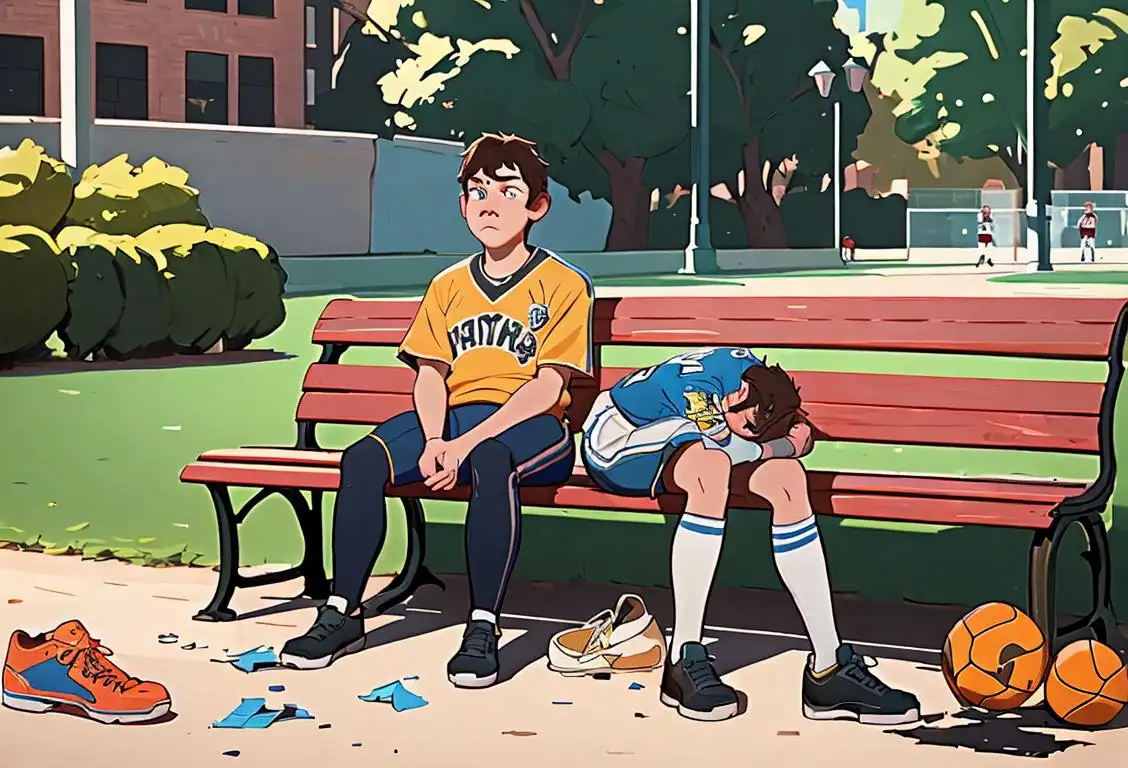National Sore Loser Day

Welcome to National Sore Loser Day, where we celebrate the art of pouting, sulking, and throwing tantrums when things don't go our way! In this article, we'll dive into the internet and actual history of this peculiar day, where sore losers unite to bask in their defeat.
When is Sore Loser Day?
It's national sore loser day on the 13th March.
What Is National Sore Loser Day?
National Sore Loser Day is a playful commemoration of those who struggle to gracefully accept defeat. On this special day, we recognize the unbridled disappointment and frustration experienced by sore losers everywhere. Whether it's losing a game of Monopoly, a tennis match, or even in the realm of politics, this day offers a chance to poke fun at ourselves and acknowledge the sheer humanity behind the sore loser syndrome.
The Internet History of National Sore Loser Day
The online origins of National Sore Loser Day can be traced back to the depths of internet message boards around 2007. The concept gained popularity due to its relatability - after all, who hasn't experienced the sting of defeat and let out an exasperated sigh or two?
While there isn't an official organization behind National Sore Loser Day, internet communities and social media platforms have embraced the lighthearted spirit of the occasion. Memes, funny videos, and personal anecdotes all flood our feeds on this day, reminding us that it's okay to let out a grumble or two when faced with a loss.
How to Celebrate National Sore Loser Day
Embracing your inner sore loser doesn't have to be a negative experience. Instead, let's turn it into a day of lightheartedness, self-reflection, and growth!
Here are a few ideas to make the most of National Sore Loser Day:
- Game Night with a Twist: Host a special game night where everyone purposefully acts like a sore loser. From exaggerated eye rolls to dramatic sighs, bring out the inner drama queen or king in each player.
- Watch Funny Fail Videos: Dive into the wonderful world of fail compilations! Spend the evening laughing at epic fails and remind yourself that even the best of us can stumble.
- Laugh at Yourself: Share your own lighthearted defeat stories on social media. Embrace the concept of acceptance and learn to see the humor in your own moments of sore losing.
Did You Know?
Did you know that the longest recorded tennis match lasted for 11 hours and 5 minutes? Now that's plenty of time for a sore loser to throw a few tantrums!
History behind the term 'Sore Loser'
1848
The Origins of the Phrase
The term 'sore loser' originated in the United States in the year 1848. It combines the words 'sore' meaning tender or painful and 'loser' referring to someone who has been defeated. The phrase was first used to describe a person who becomes upset or bitter after being defeated in a competition or contest.
1807
Origin of the term 'sore loser'
The term 'sore loser' originated in the early 19th century, specifically in the year 1807. It emerged from American English and was initially used to describe someone who exhibited a poor attitude or behavior after losing a game or competition. The term combined the words 'sore,' meaning sensitive or painful, and 'loser,' referring to the person who did not win the contest. As a concept, it captured the idea of someone feeling wounded or resentful due to their defeat.
20th Century
Popularization of the Term
During the 20th century, the term 'sore loser' gained popularity and became widely used in various contexts. It was not only applied to individuals who couldn't handle losing gracefully in games or sports but also to people who reacted poorly to any form of defeat, whether it was in business, politics, or personal relationships.
1842
Widespread usage in American literature
By the year 1842, the term 'sore loser' had gained popularity and began to appear in various American literary works. Authors used it to portray characters who displayed unsportsmanlike conduct or a lack of grace after losing. The phrase became more prominent in describing not only sportsmanship but also general behaviors connected to competitiveness and defeat.
1960s
Psychological Interpretation
In the 1960s, psychologists began to study the concept of being a sore loser from a psychological perspective. They explored the underlying emotions and motivations that drive someone to exhibit poor sportsmanship and become a sore loser. It was suggested that feelings of inferiority, competitiveness, and an inability to accept failure gracefully could contribute to such behavior.
1940s
Consolidation into a widely recognized term
During the 1940s, the term 'sore loser' became well-established and widely recognized. It found its place in common parlance and entered the collective consciousness. People commonly used the phrase to describe individuals who failed to handle defeat with grace, whether in sports, politics, or other competitive endeavors. The term had transcended its original context and become a more general expression of poor sportsmanship.
1960s
Cultural prominence and media references
In the 1960s, the term 'sore loser' gained further cultural prominence, finding its way into media references. It began appearing in newspaper articles, television shows, and films, helping to solidify its position in popular culture. The term became a recognizable descriptor of individuals who exhibited bitterness, pettiness, or unsportsmanlike conduct in the face of defeat.
1980s
Cultural Impact
By the 1980s, being a sore loser had become a well-known and recognizable characteristic in popular culture. It was often portrayed in movies, TV shows, and books. The term became associated with negative traits such as immaturity, pettiness, and an inability to handle setbacks. The cultural impact of the term further solidified its place in everyday language.
Present Day
Common Usage
In the present day, the term 'sore loser' continues to be widely used in many different contexts. It remains a part of everyday language, referring to someone who reacts poorly to losing or being defeated. Whether it's in sports, politics, or even casual competitions, the term serves as a reminder of the importance of sportsmanship and grace in both victory and defeat.
Present
Continued usage and social phenomena
Today, the term 'sore loser' continues to be widely used in everyday language, maintaining its original meaning and connotations. It has become a social phenomenon, associated not only with competitive sports but also with politics, business, and various other realms. The term represents a cultural understanding of the importance of accepting loss gracefully and behaving with dignity in defeat.
Did you know?
Did you know that the longest recorded tennis match lasted for 11 hours and 5 minutes? Now that's plenty of time for a sore loser to throw a few tantrums!Tagged
awareness fun sportsFirst identified
13th March 2021Most mentioned on
13th March 2021Total mentions
4Other days
Wing Day
Left Handers Day
Golf Day
Fitness Day
Foundation Day
Cancer Survivors Day
Dance Day
Memorial Day
Gymnastics Day
Student Athlete Day









